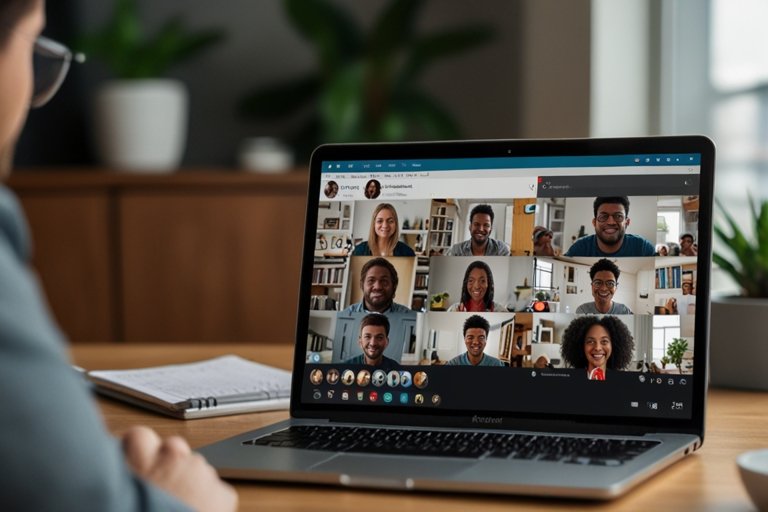Online interviews have become increasingly common in today’s job market, offering a convenient way for employers and candidates to connect regardless of location. However, the virtual setting presents its own set of challenges that require careful preparation. This comprehensive guide will walk you through the best tips for excelling in online interviews, including preparation strategies, technical considerations, and essential do’s and don’ts.
Table of Contents
Preparing for the Online Interview
Preparation is key to a successful online interview. Ensuring that everything runs smoothly can help you present yourself in the best possible light. Here’s how to prepare effectively:
Understand the Platform
Different companies use various online platforms for interviews, such as Zoom, Microsoft Teams, or Google Meet. Familiarize yourself with the platform well before the interview.
Key Steps:
- Download the Application: Ensure you have the latest version of the software.
- Explore Features: Learn how to use features like screen sharing, chat, and virtual backgrounds.
- Check Compatibility: Make sure your computer or device is compatible with the platform.
Test Your Technology
Technical issues can be a major stumbling block during online interviews. Test your technology ahead of time to avoid any last-minute problems.
Testing Checklist:
- Internet Connection: Check your internet speed and stability.
- Camera and Microphone: Test your camera and microphone to ensure they’re working properly.
- Audio Settings: Ensure your speakers and microphone levels are adjusted correctly.
- Software Functionality: Run a test call to check the functionality of the interview platform.
Choose the Right Environment
The environment in which you conduct your online interview can impact your performance. Select a quiet and professional setting where you won’t be interrupted.
Key Considerations:
- Background: Choose a clean and uncluttered background. If needed, use a virtual background that looks professional.
- Lighting: Ensure good lighting so that the interviewer can see you clearly. Natural light or a well-placed lamp can work well.
- Distractions: Minimize background noise and ensure you won’t be disturbed by family members or pets.
Prepare Your Materials
Have all necessary materials at hand and organized before the interview starts. This preparation will help you stay focused and reduce stress.
Essential Materials:
- Resume/CV: Have a copy of your resume or CV handy, either in print or on your screen.
- Job Description: Keep a copy of the job description to refer to during the interview.
- Notes: Prepare any notes or talking points you want to mention.
- Pen and Paper: Have these available for taking notes during the interview.
Dress Appropriately
Even though the interview is online, dressing professionally is crucial. Your attire can influence the interviewer’s perception of you.
Dressing Tips:
- Wear Professional Attire: Choose an outfit that aligns with the company’s dress code.
- Avoid Distractions: Wear solid colors or subtle patterns to avoid visual distractions.
- Be Neat: Ensure your clothing is clean and ironed.
During the Online Interview
When the interview starts, focus on presenting yourself in the best light. Here are some tips for navigating the interview effectively:
Make a Strong First Impression
The first impression is crucial in any interview. Make sure you start strong by being punctual and prepared.
Tips for a Great Start:
- Be On Time: Join the meeting a few minutes early to ensure everything is working.
- Greet Professionally: Greet the interviewer with a warm smile and a clear introduction.
- Confirm Audio and Video: Briefly check that the audio and video are working at the beginning of the call.
Body Language and Communication
In an online setting, non-verbal communication can be more challenging but is still important. Pay attention to your body language and communication style.
Body Language Tips:
- Maintain Eye Contact: Look at the camera when speaking to simulate eye contact.
- Sit Up Straight: Maintain a professional posture to convey confidence.
- Use Hand Gestures: Use natural hand gestures to emphasize points, but avoid excessive movement.
Communication Tips:
- Speak Clearly: Articulate your words clearly and at a moderate pace.
- Listen Actively: Show that you’re engaged by nodding and responding thoughtfully.
- Avoid Interruptions: Allow the interviewer to finish speaking before you respond.
Handling Technical Issues
Technical issues can arise unexpectedly during online interviews. Handle them calmly and professionally if they occur.
Troubleshooting Tips:
- Stay Calm: If something goes wrong, stay calm and polite.
- Communicate Issues: Inform the interviewer if you’re experiencing technical difficulties.
- Have a Backup Plan: If possible, suggest switching to a phone call or rescheduling if the issue persists.
Answering Questions Effectively
Respond to interview questions thoughtfully and concisely. Structure your answers to highlight your skills and experience.
Answering Tips:
- Use the STAR Method: For behavioral questions, structure your responses using Situation, Task, Action, and Result.
- Be Concise: Keep your answers focused and avoid rambling.
- Show Enthusiasm: Express genuine interest in the role and the company.
Asking Questions
Asking questions demonstrates your interest and helps you determine if the role is a good fit for you. Prepare thoughtful questions to ask at the end of the interview.
Example Questions:
- “Can you describe the team I would be working with?”
- “What are the biggest challenges facing this position?”
- “How do you measure success in this role?”
- “What opportunities for professional development does the company offer?”
Do’s and Don’ts for Online Interviews
Knowing what to do and what to avoid can make a significant difference in your online interview performance.
The Do’s: Best Practices
- Do Prepare Thoroughly: Familiarize yourself with the interview platform and test your technology in advance.
- Do Dress Professionally: Even though the interview is online, dress as you would for an in-person interview.
- Do Maintain a Professional Environment: Ensure your background is tidy and free of distractions.
- Do Practice Good Body Language: Maintain eye contact, sit up straight, and use natural hand gestures.
- Do Communicate Clearly: Speak clearly and at a moderate pace, and listen actively.
The Don’ts: Common Mistakes
- Don’t Neglect Technical Preparation: Avoid last-minute tech issues by testing everything beforehand.
- Don’t Use Distracting Backgrounds: Avoid cluttered or inappropriate backgrounds that can divert attention.
- Don’t Interrupt the Interviewer: Allow the interviewer to finish speaking before you respond.
- Don’t Overlook Lighting: Poor lighting can affect how you are seen on camera. Ensure you are well-lit.
- Don’t Fidget or Appear Distracted: Stay focused and avoid fidgeting or appearing disinterested.
Post-Interview Follow-Up
After the interview, it’s important to follow up appropriately. This can reinforce your interest and leave a positive impression.
Send a Thank-You Note
A thank-you note is a professional courtesy that demonstrates your appreciation and reinforces your interest in the role.
Tips for a Thank-You Note:
- Send It Promptly: Aim to send the note within 24 hours of the interview.
- Be Brief and Sincere: Express your gratitude and briefly mention something specific from the interview.
- Reiterate Interest: Reaffirm your interest in the position and the company.
Reflect on the Interview
Reflect on your performance to identify areas for improvement and to prepare for future interviews.
Reflection Tips:
- Evaluate Your Answers: Consider what worked well and what could be improved.
- Assess Your Comfort Level: Reflect on how comfortable you felt with the technology and the interview format.
- Identify Follow-Up Actions: If applicable, make a note of any additional steps or materials needed.
Handle Rejection Gracefully
Not every interview will result in an offer. Handle rejection with professionalism and use it as a learning experience.
Rejection Tips:
- Request Feedback: If possible, ask for feedback on your interview performance.
- Stay Positive: Keep a positive attitude and continue your job search.
- Maintain Connections: Keep in touch with the interviewer or company for future opportunities.
Conclusion: Your Path to Success
Online interviews can be a valuable opportunity to showcase your skills and fit for a role. By preparing thoroughly, following best practices, and handling technical issues gracefully, you can make a strong impression and increase your chances of success. Remember, each interview is a learning experience, Good Luck!








